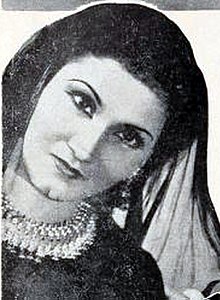Malika-e-Tarannum Noor Jehan | |
|---|---|
| نور جہاں | |
 Noor Jehan in 1945 film Zeenat | |
| Born | Allah Rakhi Wasai 21 September 1926 |
| Died | 23 December 2000 (aged 74) |
| Resting place | Gizri Graveyard, Karachi |
| Nationality | British India (1926–1947) Pakistani (1947–2000) |
| Other names | The Nightingale of The East Queen of Hearts[1] Daughter of Nation[2] The Nightingale of Punjab[3] |
| Occupations |
|
| Years active | 1930 - 2000 |
| Notable work |
|
| Style | |
| Title | "Malika-e-Tarannum" (Queen of Melody) |
| Spouses | |
| Children | 6 , including Zil-e-Huma, Nazia Ejaz Khan |
| Parents |
|
| Relatives |
|
| Awards | 15 Nigar Awards |
| Honours |
|
Noor Jehan (21 September 1926 – 23 December 2000)[a] was a Pakistani playback singer and actress who worked in both British India and later in Pakistan's cinema. Her career lasted over six decades, during which she recorded 10,000 songs. Jehan had proficiency in Hindustani classical music, as well as in other genres such as Punjabi and Sindhi. She made her directorial debut with the film Chann Wey in 1951, becoming the first female film director in Pakistan. She is recognized for her contributions to music in the Indian subcontinent, particularly in Pakistan. She was given the title of Malika-e-Tarannum ("Queen of Melody") in Pakistan.[8]
Along with Ahmed Rushdi, she holds the record for having given voice to the largest number of film songs in the history of Pakistani cinema. She recorded about 10,000 songs in various languages, including Urdu, Punjabi, and Sindhi.[9] She sang a total of 2,422 songs in 1,148 Pakistani films during a career that lasted more than half a century.[10] She is also considered to be the first female Pakistani film director.[11]
- ^ "Queen of hearts". The News International. Archived from the original on 25 May 2022. Retrieved 14 January 2022.
- ^ "'Noor Jehan infused a new spirit of patriotism, motivated Armed Forces during the 1965 war'". Daily Times. 7 September 2021. Archived from the original on 25 May 2022. Retrieved 18 September 2021.
- ^ "Noor Jehan lives on in her songs". The Tribune India. 18 June 2022.
- ^ Firoze Rangoonwalla, Indian Filmography, publisher: J. Udeshi, Bombay, August 1970, passim.
- ^ Ashish Rajadhyaksha and Paul Willemen, Encyclopaedia of Indian Cinema, British Film Institute, Oxford University Press, New Delhi, 2002, pp. 166.
- ^ https://minutemirror.com.pk/remembering-legendary-madam-noor-jehan-on-her-97th-birthday/[permanent dead link]
- ^ "Death anniversary of Malika-e-Tarannum Noor Jehan observed". Radio Pakistan. 6 September 2023.
- ^ "In memoriam: 9 facts about 'Malika-e-Tarannum' Noor Jehan". The Express Tribune. 23 December 2017. Retrieved 21 October 2024.
- ^ "'Queen of Melody' Noor Jehan remembered on 94th birth anniversary". Daily Times. 1 September 2022.
- ^ Azad, Arif (5 January 2001). "Obituary: Noor Jehan". the Guardian. Retrieved 8 April 2018.
- ^ "Remembering the legend of Noor Jehan", The News International, retrieved 22 July 2021
Cite error: There are <ref group=lower-alpha> tags or {{efn}} templates on this page, but the references will not show without a {{reflist|group=lower-alpha}} template or {{notelist}} template (see the help page).